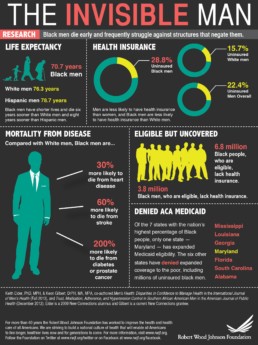How do people who live in underserved neighborhoods access the quality health care they deserve? And what happens when they can’t?
As strategic communications counselor to the Robert Wood Johnson Foundation (RWJF), we trained a bright spotlight on health disparities while advancing RWJF’s mission to build a culture of health for all Americans.
HEAL engaged audiences outside RWJF’s reach in new ways and maximized the Foundation’s brand influence. Its galvanizing effect was epitomized by The Invisible Man, an article and infographic highlighting the work of RWJF scholars Keon Gilbert and Keith Elder.
Consider the stunning health disparities experienced by Black men as compared to their white male counterparts, with death rates that are:
- 30 percent higher from heart disease
- 60 percent higher from stroke
- 200 percent higher from diabetes
- Over 200 percent higher from prostate cancer
Yet many Black men don’t readily access health care even when they are insured.
Through the evocative theme “The Invisible Man,” McKinney gave Gilbert and Elder a platform from which to tell the story beyond scholarly journals to strategic audiences.
As Elder explained, “Our published research is important, but the people we need to reach aren’t in the academic world. They are in the barbershop, on the basketball court, and in communities that are medically underserved.”
Central to our work was an information gathering and placement project called HEAL (Health Equity Advances Lives). Designed to promote RWJF’s innovative programs, scholars and grantees, HEAL actively produced, repurposed and placed content about health policy trends, research and findings.
HEAL reached millions over a six-week span, deploying the research and a striking infographic. The content went viral, from weekly print publications in California to large websites and influential blogs across the country.
Starting with a placement in The AFRO, which publishes a print edition and boasts nearly 600,000 Facebook followers, the piece was picked up by BET.com, BlackHealthMatters.com, ZocDoc.com, ThinkProgress and TheBlackManCan.org, among many other publications.

